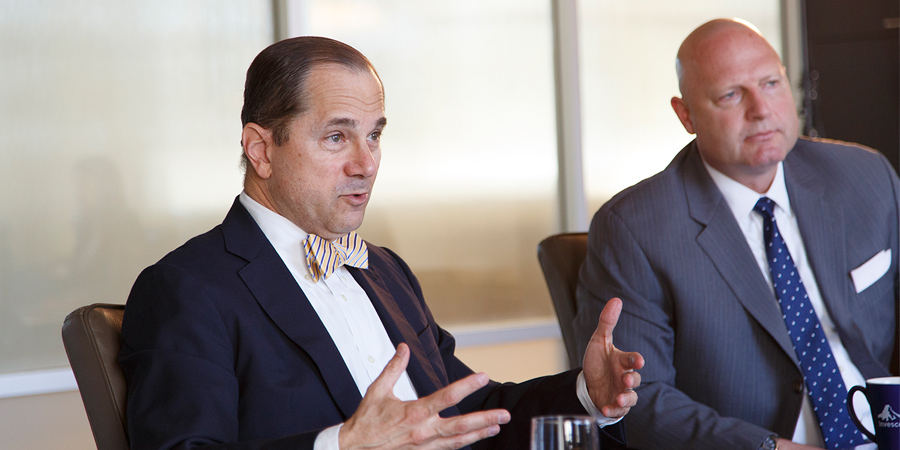by Joachim Klement, CFA, CFA Institute
“The word ‘politics’ is derived from the word ‘poly’ meaning ‘many,’ and the word ‘ticks,’ meaning ‘blood-sucking parasites.'” — Unknown
The narrative of global markets is shifting away from its focus on central banks and monetary policy toward geopolitics and fiscal policy. The surprise outcomes of the UK referendum on membership in the European Union and the US presidential election suggest that the “old world order” of increased globalization and liberalization may be changing.
Add to that the constant threat of terror attacks, the proliferation of civil wars, and increased tensions among major economies and the message is clear: Investors need to become experts in the rapid assessment of geopolitical events to be successful in the coming years.
The problem in this new world is that while predicting monetary policy and the behavior of central bankers over the past few years has been difficult, it’s a walk in the park compared to anticipating what politicians will do in the years ahead.
No wonder the economic policy uncertainty index calculated by Scott R. Baker, Nicholas Bloom, and Steven J. Davis has reached all-time highs in Europe and China in 2016 and is at very elevated levels in the United States. This year investors will have to predict how Brexit negotiations and elections in France, Germany, and the Netherlands will influence the markets.
Only a lunatic would dare to make forecasts about all this. Maybe it’s a sign that I’m losing my marbles, but I do think that we can make predictions in the same way we can anticipate the effect of planned legislation in the United States.
Economic Policy Uncertainty

Source: Scott R. Baker, Nicholas Bloom, and Steven J. Davis
Sentiment shocks offer opportunities.
To assess how geopolitical events will influence the investment landscape, it pays to return to first principles. Most asset prices and equity prices, in particular, are driven by a small set of fundamental variables: real risk-free interest rates, inflation expectations, the ability of businesses to pay for interest and make a profit, future earnings growth, and a risk premium.
Monetary policy is so critical because it can influence the real risk-free rate and inflation. Fiscal policy and geopolitical events, on the other hand, tend not to affect real risk-free rates or inflation expectations (though there are some exceptions to the rule, but more on that later). Typically, policy influences either the risk premium or the ability of businesses to generate profits.
The advantage of the vast majority of geopolitical shocks is that they affect the risk premium and not the fundamentals of a business. Terrorist attacks, election outcomes, changes in political leadership, and similar events influence investor sentiment and increase the risk premium on stocks and other investments.
But these events tend to be very short-lived and normalize quickly. In the aftermath of the terrorist attacks on 11 September 2001, the US stock market took about three months to to recover its losses. about three weeks to recover from the Madrid bombings of 11 March 2004, and about one day to recover from the 7 July 2005 London bombings.
Similarly, equity markets digested the Brexit shock within a couple of days and the US election results within a couple of hours. These patterns have been investigated more thoroughly by Jonathan Brogaard and Andrew Detzel who concluded that a one standard deviation spike in economic policy uncertainty leads to a 1.5% increase in equity returns over the subsequent three months. These excess returns normalize quickly, however: Within two to three months, the effect essentially disappears.
What does this mean? Investors can exploit political and geopolitical sentiment shocks by buying stocks and other assets after they’ve sold off and hold on to them for a couple of months until they have recovered.
Investors who want to take advantage of such shocks might also consider the degree of foreign ownership to assess the size of the potential effect and recovery. The cohort of investors that reacts most negatively to surprises tend to be foreign investors who have less information and less trust in the government or the economy of a specific country. Thus, a higher share of foreign investors in a market implies a more volatile market reaction.
Because the US stock market is dominated by domestic investors while European stock markets are dominated by foreign investors, political uncertainty in the United States is going to have less of an effect on US stock market volatility than European political uncertainty on European markets.
Share of Stock Market Held by Foreign Investors

Sources: US Federal Reserve, Office for National Statistics, Deutsche Bundesbank, Banque de France, Reuters, Tokyo Stock Exchange
Election shocks in Europe should provide investment opportunities.
Based on this simple analysis, strong showings by populist parties in the upcoming European elections would be a great outcome for investors. Electoral wins for the National Front in France, the Alternative for Germany, or the Five Star Movement in Italy would likely rock European stock markets to their core. But they would also trigger a strong depreciation of the euro.
These would be great times for investors to pick up good companies at bargain prices. So preparing for such a scenario with quickly deployable cash holdings might be a good strategy.
Some political events may have a long-term effect.
This might sound like playing with fire. After all, a victory for Marine Le Pen in the French presidential election could lead to the unraveling of the euro or the EU.
But in assessing the potential long-term effect of political events, I apply the same degree of skepticism as I do for diet fads: If there is a doubt about their effectiveness, there is no doubt — the diet won’t work. Similarly, only events that have a direct and immediate effect on economic growth or the profitability of a business will have a long-term influence. If there is only a tenuous connection, there probably won’t be a lasting effect.
Apply the “Could Test.”
I also apply what I call the “Could Test.” What do I mean by this? In discussions with colleagues about the potential ramifications of a geopolitical event, I listen for the word “could.” If someone argues that the event could effect earnings growth, it most likely won’t.
In the case of the upcoming European elections or Brexit negotiations, the “Could Test” leads to a clear prediction. All of these events could seriously influence the future of the euro or the EU, which will seriously affect corporate earnings and future growth.
But businesses and markets are incredibly robust, and given sufficient time, they will find a way around almost any obstacle.
The massive appreciation of the Swiss franc in 2015, when the Swiss National Bank (SNB) decoupled it from the euro, was a five standard deviation shock to Swiss exporters. Yet the Swiss economy did not go into recession and Swiss exporters adapted to the changed environment very quickly.
The Brexit shock of 2016 has yet to be much of a shock to UK stock markets. The weakness of the pound sterling has more than compensated for whatever detrimental effect the heightened uncertainty about the future might have.
As a German, I am a natural-born pessimist, so I had to learn the hard way that geopolitical risks rarely have long-term consequences. But there are several political events that can have a lasting influence on the markets. Investors need to understand how to identify them and what transmission mechanisms will drive markets in these circumstances. The table below shows a brief list of political events that can have a medium or long-term effect.

In future blog posts, I will explore these events to identify the opportunities each of them may provide. In each case, the study of financial market history provides guidance and evidence on how such geopolitical events might play out in practice.
If you liked this post, don’t forget to subscribe to the Enterprising Investor.
All posts are the opinion of the author. As such, they should not be construed as investment advice, nor do the opinions expressed necessarily reflect the views of CFA Institute or the author’s employer.
Image credit: ©Getty Images/uschools












